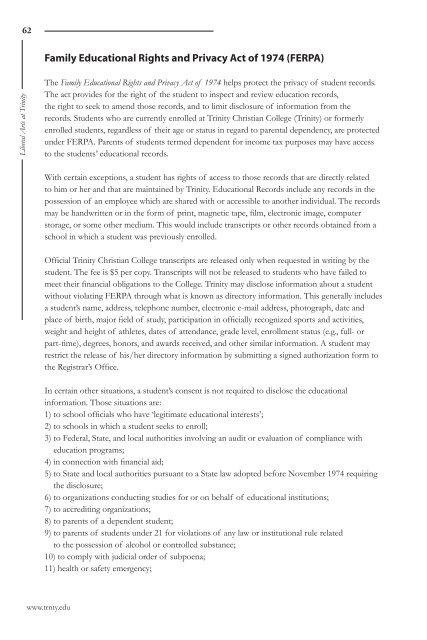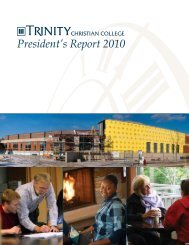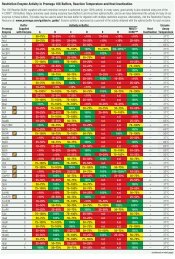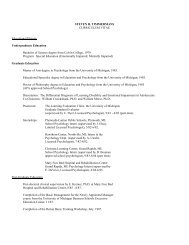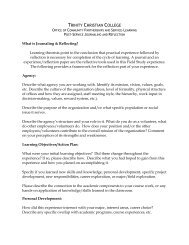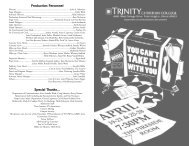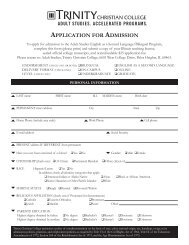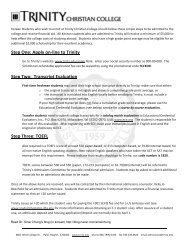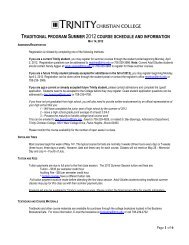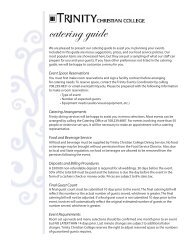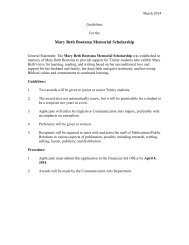College's catalog - Trinity Christian College
College's catalog - Trinity Christian College
College's catalog - Trinity Christian College
Create successful ePaper yourself
Turn your PDF publications into a flip-book with our unique Google optimized e-Paper software.
62<br />
Family Educational Rights and Privacy Act of 1974 (FERPA)<br />
Liberal Arts at <strong>Trinity</strong><br />
The Family Educational Rights and Privacy Act of 1974 helps protect the privacy of student records.<br />
The act provides for the right of the student to inspect and review education records,<br />
the right to seek to amend those records, and to limit disclosure of information from the<br />
records. Students who are currently enrolled at <strong>Trinity</strong> <strong>Christian</strong> <strong>College</strong> (<strong>Trinity</strong>) or formerly<br />
enrolled students, regardless of their age or status in regard to parental dependency, are protected<br />
under FERPA. Parents of students termed dependent for income tax purposes may have access<br />
to the students’ educational records.<br />
With certain exceptions, a student has rights of access to those records that are directly related<br />
to him or her and that are maintained by <strong>Trinity</strong>. Educational Records include any records in the<br />
possession of an employee which are shared with or accessible to another individual. The records<br />
may be handwritten or in the form of print, magnetic tape, film, electronic image, computer<br />
storage, or some other medium. This would include transcripts or other records obtained from a<br />
school in which a student was previously enrolled.<br />
Official <strong>Trinity</strong> <strong>Christian</strong> <strong>College</strong> transcripts are released only when requested in writing by the<br />
student. The fee is $5 per copy. Transcripts will not be released to students who have failed to<br />
meet their financial obligations to the <strong>College</strong>. <strong>Trinity</strong> may disclose information about a student<br />
without violating FERPA through what is known as directory information. This generally includes<br />
a student’s name, address, telephone number, electronic e-mail address, photograph, date and<br />
place of birth, major field of study, participation in officially recognized sports and activities,<br />
weight and height of athletes, dates of attendance, grade level, enrollment status (e.g., full- or<br />
part-time), degrees, honors, and awards received, and other similar information. A student may<br />
restrict the release of his/her directory information by submitting a signed authorization form to<br />
the Registrar’s Office.<br />
In certain other situations, a student’s consent is not required to disclose the educational<br />
information. Those situations are:<br />
1) to school officials who have ‘legitimate educational interests’;<br />
2) to schools in which a student seeks to enroll;<br />
3) to Federal, State, and local authorities involving an audit or evaluation of compliance with<br />
education programs;<br />
4) in connection with financial aid;<br />
5) to State and local authorities pursuant to a State law adopted before November 1974 requiring<br />
the disclosure;<br />
6) to organizations conducting studies for or on behalf of educational institutions;<br />
7) to accrediting organizations;<br />
8) to parents of a dependent student;<br />
9) to parents of students under 21 for violations of any law or institutional rule related<br />
to the possession of alcohol or controlled substance;<br />
10) to comply with judicial order of subpoena;<br />
11) health or safety emergency;<br />
www.trnty.edu


